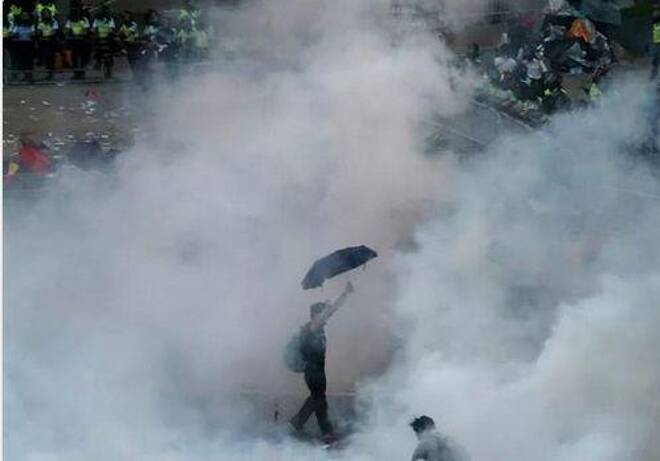Advertisement
Advertisement
The Umbrella Movement’s Potential Domino Effect – Part 2
By:
This is part 2 of a 2 part article researched by Scott Carter of Lear Capital. Scott is a leading expert in gold investing and a well known analysts of
This is part 2 of a 2 part article researched by Scott Carter of Lear Capital. Scott is a leading expert in gold investing and a well known analysts of the global markets. Check Scott’s background out or learn more about Lear Capital at their online portal. Learn how protests in China has an effect on gold and other precious metals, such as silver and platinum.
Perhaps most important of all, Hong Kong has given China critical access to global markets and functioned as a stable environment for trade. With a fair court system and pro-business protections, Hong Kong has helped Chinese companies raise billions in capital and loan financing while their homeland has remained historically isolated and closed-off.
Hong Kong on the other hand, is a gregarious global player that has managed to maintain its individual character, its special freedoms, and its political autonomy … until now. The protesters see Beijing as pulling back and reneging on that age-old promise of “one country, two systems” and while brandishing their pepper-spray shielding umbrellas, these determined “Umbrella Revolutionaries” are demanding full suffrage.
It’s not surprising when these well-educated, Western influenced, and relatively well-off Hong Kongers perceived a pull-back in political freedom … that the end result has been resistance. Thousands of protesters have demanded the removal of Beijing-backed Leung Chun-ying and for China to keep its vetting and hand-picked candidate pools out of Hong Kong politics.
Beijing is very unlikely to back down. They believe that permitting Hong Kong free political participation will weaken their government and encourage similar pro-democracy movements throughout Asia … the Tibetan Independence movement comes to mind as does the Uyghur, Mongolian, and Taiwanese movements. China’s fear of a domino effect is not without its merit as there is a growing Muslim insurgency in South Thailand and countless separatist movements brewing throughout South Asia in regional hotbeds in Myanmar, India, Indonesia, Nepal, Laos, Sri Lanka, Turkey, Vietnam and Yemen.
For China, this is perhaps the worst time to not only endure an insurrection movement but to grapple with the question of whether the two systems can ultimately co-exist. They very much want Hong Kong to come into the one-party fold but if Hong Kongers reject such an arrangement and chaos erupts, it could weaken the totalitarian grip upon which China’s economic engines function.
Chinese GDP has already been hurt by rising wages and rising foreign exchange rates. American companies and consumers have also become increasingly disheartened by Chinese quality and environmental concerns as well as government corruption and cover-ups. While Chinese manufacturing costs remain low by comparison, they are becoming increasingly offset by the soaring transportation costs and extended turnaround times which threaten to stifle US manufacturing demand.
The IMF is forecasting a continued Chinese slump which undoubtedly has the potential to further undermine global stability. Add to this a war of wills between the Beijing oligarchs and the freedom charged students of the Umbrella Revolution, and we have an ideological impasse with no easy resolution. China will continue to prohibit all support for democratic and capitalistic doctrine from its territories … and insurgencies will continue to challenge it.
Hong Kong has spent much of its recent history “not” being China, so one wonders why it would now embrace a clearly Chinese political agenda to determine its future. Those on the mainland are well aware of the freedoms, luxuries, and privileges of Hong Kong’s special status. Even with media blackouts, the censorship, and the Chinese army clamping down … some have been quietly pulling for the protesters. Is Hong Kong perhaps what Chinese subjects aspire to be or secretly dream of becoming?
There’s no doubt that Hong Kong’s democratic movement has now been mobilized. For China, it will be a lingering challenge, for the globe it will be another revolt about to catch fire, and for investors it is yet another reason to seek out global safe havens and the steadfastness of tangible money.
About the Author
Barry Normanauthor
Advertisement
